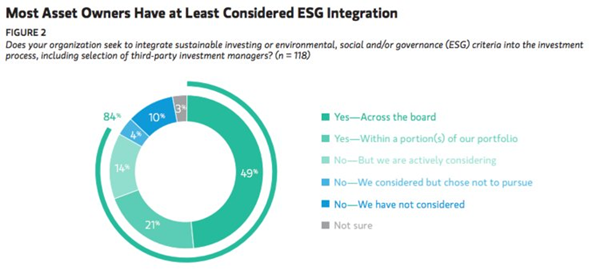
Money managers are flocking to a $23
trillion investing strategy that Morgan Stanley says is ready to take
off
Joe Ciolli
Jun. 18, 2018, 12:30 PM
|

Getty Images / Chris Hondros |
-
Environmental,
social, and governance investing — also known as ESG — has exploded
in popularity, with roughly $23 trillion being invested with at
least a partial ESG mandate.
-
Morgan Stanley sees
several factors combining to make ESG an even bigger investment
force than it already is.
Sustainable investing is
here to stay, whether money managers like it or not. And if
Morgan Stanley's
prognostications are correct, it's about to start making its influence
felt to an unprecedented degree.
The firm published a
report on the state of environmental, social, and governance investing
— or
ESG, as it's more commonly
called — and found it to be at a tipping point. The strategy is
growing at a time when investor reservations are vanishing, creating
an ideal situation for growth, according to Morgan Stanley.
Money managers already
have almost $23 trillion earmarked with an ESG mandate, which is
roughly 25% of the entire global investment universe. Roughly $8.7
trillion of that is US money, while European investors account for
another $12 trillion, Morgan Stanley data show.
As the chart below
shows, 84% of the 118 assets owners surveyed by the firm are at least
"actively considering" integrating ESG criteria into their investment
decisions, with nearly half saying they're seeking implementation
across the board. For context, the group spans public and corporate
pensions, endowments, foundations, sovereign wealth entities,
insurance companies, and other large asset owners worldwide.
|

Morgan Stanley |
While the high
percentage of desired adoption is a positive sign for ESG, the
strategy must still contend with the perception that, by engaging in
sustainable investing, traders are sacrificing potential returns in
the name of a good cause. Morgan Stanley recently conducted a separate
individual investor survey that found 57% of respondents believing ESG
requires a "financial trade-off."
After all, as the chart
below shows, proof of performance remains the top deciding factor for
investors considering an ESG strategy.
|

Morgan Stanley |
Luckily for ESG
enthusiasts, the firm says this misguided idea seems to be fading.
"It appears that large
institutional asset owners may be replacing this view with a more
sophisticated recognition that ESG factors provide unique insights
into long-term risks and opportunities that might not be captured by
traditional financial factors," Morgan Stanley analysts wrote in a
report.
What's more, the firm
finds that the future looks bright for ESG, considering the investment
behaviors of millennials. Morgan Stanley's 2017 survey of individual
investors found they're more than twice as likely as other generations
to consume products made by companies seen as sustainable.
With all of that
established, it's clear that ESG has a bright future of growth ahead
of it, especially as the notion of a value trade-off evaporates.
"Fueled by a convergence
of long-term performance considerations with trends like mission
alignment, regulations and stakeholder demand, interest in sustainable
investing has both accelerated and evolved," the firm said. "We expect
many more opportunities to open up for those managers who are able to
build the products, relationships and trust that can help investors
generate strong risk-adjusted returns while having a positive impact
on the world."
* Copyright © 2018
Insider Inc. All rights reserved. |